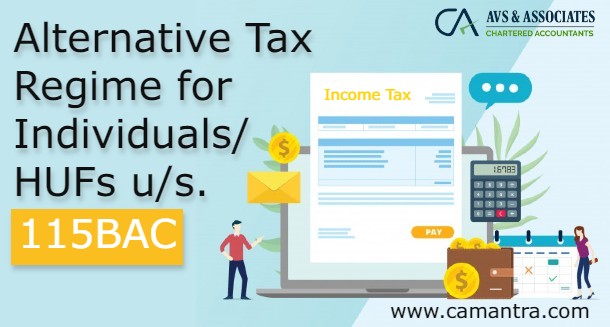As we are aware that income of Individuals/HUFs are taxable according to the progressive tax slabs. The maximum rate of tax payable is @30%, when income of Individual/HUF exceeds INR 10.00 Lacs in relevant previous year.
The Central Government has inserted Section 115BAC w.e.f. AY 2021-22 to endow Optional Tax Regime to HUFs/individuals.
Income Tax Rate under Alternative Tax Regime [As per Section115BAC];
| Total Income | Rate of Tax |
| Up to Rs. 2,50,000 | NIL |
| From Rs. 2, 50,001 – Rs. 5,00,000 | 5% |
| From Rs. 5,00,001 – Rs. 7,50,000 | 10% |
| From Rs. 7, 50,001 – Rs. 10,00,000 | 15% |
| From Rs. 10,00,001 – Rs. 12,50,000 | 20% |
| From Rs. 12,50,001 – Rs. 15,00,000 | 25% |
| Above Rs. 15,00,000 | 30% |
Note: In this regime the exemption limit for all categories of individuals such as Individual, Senior Citizen & Super Senior Citizen are the same which is INR 2,50,000.
REBATE Under Section 87A
Rebate is available, if taxable income of an Individual/HUF does not exceed INR 5,00,000, then rebate to the extent of INR 12,500 in payment of tax is available same as old regime of taxation.
Tax on Other Incomes
If an individual/HUF has income from other sources which are taxable at the rate mention under Income Tax Act, 1961- Chapter XII then sum income are taxable with such rate specified and balance income will be taxable at the rate mentioned in Section 115BAC.
Surcharge and Education CESS
The Surcharge applicable in existing tax regime is applicable to Alternative Tax Regime also.
The rates of surcharge are mentioned in the below table
| Total Income | Rate of Surcharge |
| If total taxable income is less than Rs. 50,00,000 | NIL |
| From Rs. 50,00,000 – Rs. 1,00,00,000 | 10% |
| From Rs. 1,00,00,000 – Rs. 2,00,00,000 | 15% |
| From Rs. 2,00,00,000 – Rs. 5,00,00,000 | 25% |
| Above Rs. 5,00,00,000 | 37% |
Note:
- If total income of an individual/HUF contains income from Capital Gains and tax will be calculated under section 111 A or 112A, then Surcharge on total taxable income does not exceed @15%.
- The Income Tax + Surcharge as calculated above will be increased by Health and Education Cess @4%.
- The Maximum Marginal Tax rate under Alternate Tax Regime will be @44.744% i.e. [30+30*37%+ {30+30*37%} *4%].
Important Conditions & Restrictions
An Individual/HUF has to satisfy below mentioned conditions to get all benefits of lower tax under Alternate Tax Regime of Section 115BAC.
Employment of an individual may be salaried /retired employee who are having salary income or self-employed personal (having business income) or any other individual (having any income from any source).
Incentives which are listed below Available In Old Tax Regime are Not Available In Alternate Tax Regime:
An Individual/HUF’s total income will be calculated without resorting these incentives:-
- LTA (Leave Travel Concession) [Section 10(5)];
- HRA (House Rent Allowance) [Section 10(13A)];
- All Special Allowances except
- Travelling and transfer Allowance
- Conveyance Allowance for official purposes; and
- Transport Allowance to an employee who is blind or deaf or dumb or orthopedically handicapped [Rs. 3200/-pm under section 10(14)].
- Allowance to MPs/MLAs [Section 19(17)]
- Minor Child income rebate Rs. 1500/-per month [ section 10(32)]
- Special Economic Zone [ Section 10AA]
- Exemption of perks [ Free Food & non-alcoholic beverage (which is Rs. 50.00 /meal)
- Standard deduction under section. 16(ia) of Rs. 50,000/-
- Entertainment Allowance under section 16(ii)
- Professional Tax Paid under section 16(iii)
- Interest on Housing Loan [ Available INR 2 lacs max on two self-occupied properties] Section 24(b)
- Additional depreciation under section 32(1)(iia)
- Investment Allowance in case of backward areas under section 32AD
- Tea/Coffee Development Fund Allowances under section 33AB
- Site Restoration Fund Allowance under section 33ABA
- Scientific Research Deduction- Section 35(1)(ii)/(iia)/(iii) & 35(2AA)
- Capital Expenditure pertaining to specified businesses under section 35AD
- Agriculture Extension Project under section 35CCC
- Standard deduction if family get pension under section 57(iia)
- Deduction under section 80C – section 80U [ employers’ contribution towards NPS under section 80CCD (2), deduction under section 80JJAA & Deduction under section 80LA(1A) are allowed]
Note:
- The interest on PPF (as well as final payment at the time of maturity) will remain exempted under section 10(1) even if person opt for Alternate Tax Regime under section 115BAC.
- Interest from Sukanya Samridhi Account (withdrawal or final payment too from such account) will be remain exempted under section 10(11A).
These Exemptions Are Available Under Alternate Tax Regime Also; see the list:
- Exemption pertaining to payment of Gratuity under section 10(10)
- Exemption pertaining to Commutation of pension under section 10(10A)
- Exemption pertaining to Leave Encashment under section 10(10AA)
- Exemption pertaining to Retrenchment Compensation Scheme under section 10(10B)
- Exemption pertaining to payment scheme of voluntary retirement /separation under section 10(10C)
- Exemption pertaining to tax paid by the employer on non-monitory perks under section 10(10CC)
- Exemption pertaining to payment received under life insurance policy under section 10(10D)
- Exemption pertaining to interest and withdrawal from RPF under section 10(12)
- Exemption pertaining to payment including withdrawal from NPS under section 10(12A)/(12B)
- Exemption pertaining to payment from Super Annuation Fund under section 10(13)
Status Of Losses Of Previous Years:-
An Individual’s/HUF’s total income will be calculated without giving effect of any loss brought forward from previous years (if such loss /additional depreciation pertains to any deductions as mentioned above)
Depreciation For Current Period:-
An Individual’s/HUF’s total income is calculated after claiming depreciation (other than additional depreciation) is such manner as may be determinate.
Alternate Minimum Tax
Provisions of Section 115JC are not applicable, when an Individual/HUF choose for Alternate Tax Regime and his/her accumulated AMT Credit will also be lapsed and assessee cannot carry forward the same for set off.
CBDT Clarification: On 13th April, 2020 through vide Circular No. C1/2020 states that an employee (who does not have income from business/profession) can opt for the lower tax regime U/s. 115BAC through the same intimation to the employer.
Upon such intimation the employer (TDS Deductor) shall count the amount to tax to be deducted from payment to Individual/HUF, under section 192 as per the provisions of Section 115BAC.
NOTE:
- The above intimation by an employee to his/her employer is only for TDS deduction and can’t be modify during the year;
- Such intimation to the employer doesn’t amount to exercise of option by the concerned employee. The concerned employee is required to exercise the option under Section 115BAC (5) at the submission time of his/her return of income. An employee may opt old regime at the time of filing of his/her return for previous year for which he/she has intimated to his/her employer to deduct TDS as per the provisions of Section 115BAC.
- In case if an employee doesn’t intimate his/her employer regarding his/her option to choose alternate (low) tax regime or old tax regime, then employer while deducting TDS from their income ignore provisions of Section 115BAC and deduct TDS as per Old Tax Regime.
Conclusion
The government has given options to Individuals/HUFs to select the better tax regime benefits for them. The Alternate (Lower) Tax Regime is profitable to those assesses belong to higher income groups. The Alternate Tax Regime are advantageous for those assessees, for whom exemptions/deductions do not matter. We need to choose our option after assessing & calculating all benefits available in old tax regime and comparing it with alternate tax regime. Hence, be aware of various rebates/exemptions/deduction’s provision available to you in Income Tax Act, 1961 and pay your genuine taxes and concentrate on tax planning not on tax evasion. A proper tax planning well in advance will save high chunk of your outgoing taxes and this cultivate in you saving skills and knowledge towards different avenues available in the market.

